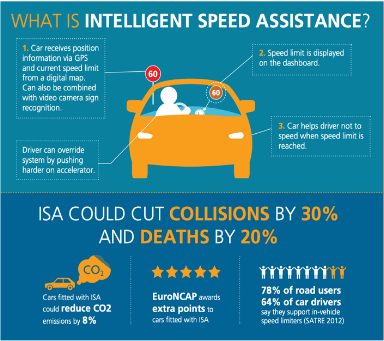Will this come to America next?
It seems like lately the nanny state is really flexing its muscles, especially in places like Europe. One of the latest encroachments on personal choice is what the European Union calls “Intelligent Speed Assistance” or ISA. This exciting new technology will be made standard on all new car models sold in Europe starting this year and in all new cars starting in 2024.
Learn how the UK is moving toward eliminating private cars here.
At its core, ISA is all about stopping drivers from speeding. Plenty of people will see no problem with this, considering we all deal with reckless morons who speed through traffic like they’re in some sort of race, putting everyone in danger. While nobody enjoys others’ choices putting them at risk, that is one of the core consequences of having free will. Speeding drivers can face other consequences, like the police pulling them over and issuing a citation, increased insurance rates, even more wear and tear on their vehicle.

Instead, the EU wants to nag and shame those who choose to speed. This is done all in the name of safety, a reason cited for salami slicing more and more personal freedoms away from citizenries these days. However, there are many unintentional consequences which could make us less safe as well as less free.
ISA is a technology which uses cameras and GPS to track what the speed limit is on the stretch of road where you’re traveling. Originally, ISA would then cut the throttle on the car, forcing it to slow to the speed limit or below. The European Transport Safety Council has been so excited about this tech, it called ISA the greatest thing for automotive safety since the seatbelt. What the ETSC assumes is that speed is the factor contributing to the recent increase in road fatalities. However, there is compelling information that the true cause of more deaths in cars has been fueled in large part by distracted drivers (who could be figuring out how to make a settings change on an overly complex touchscreen) and drivers feeling less obligation to be careful because of all the safety systems constantly chirping at them.

In the current form as approved by the EU, ISA systems can’t limit what a driver can do with a car. Instead, when it detects the vehicle is speeding, an audible warning can sound and the accelerator pedal can start vibrating, warning the driver they’re in violation. From there, the accelerator pedal can start gently pushing the driver’s foot back, encouraging them further to slow down. Add this to all the other electronic nannies constantly chirping at drivers, all under the pretense of greater safety, and driving becomes that much less enjoyable, which might be the point.
Thankfully, this current version of ISA not only can be overridden, it can be switched off – for now. However, if there’s an incident and the police find you’ve overridden or turned off the system, there’s no telling what consequences you might face. Your insurance company might sock it to you as well.

This move toward ISA is about more than just road safety, even though that’s one of the big things used to justify its implementation. It’s also supposed to encourage more people to walk or ride bicycles, since supposedly speeding cars have discouraged such activity, not distracted drivers. The technology is also aimed at discouraging people from driving, probably so they can escape the shaming and nagging.
Supposedly, forcing cars to go slower will mean increased fuel economy (that depends on the car) and in turn fewer CO2 emissions. In other words, ISA is also about “saving the planet” by decreasing vehicle emissions. Yes, everything ties back to the so-called “climate crisis.”
However, environmental activists aren’t happy with the EU’s version of ISA. They think it doesn’t go far enough since drivers can choose to ignore the in-vehicle warnings and continue speeding. Expect them to push for absolute government control of the operation of all private vehicles. There’s a term for governments assuming control of private property, but I’ll let you parse that one out. Could a similar push be coming to the United States and other countries? And if successful, what will be the next vehicle “safety” measure imposed on citizens?
Read the European Commission announcement on ISA here.
Images via Erik Mclean, Pixabay, European Commission, Rosemary Ketchum






